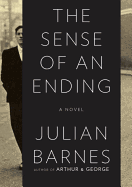
Julian Barnes's The Sense of an Ending is a sneaky little hand grenade of a novel. Just when you've pegged it as one man's blokeish but harmless retrospective of his muddled youthful friendships and middling amours, and admired his frank confession of wounds long salved by a blameless maturity, and nodded your assent to yet another quaint warning about the malleability of time and memory, the pin falls out. The ensuing detonation reilluminates the novel's entire battlefield of characters and relationships with much deeper emotional consequences and delivers a flaying lesson in the pitfalls of overburnishing the stories we tell ourselves about the past.
For most readers, it will be difficult to resist reading the tale anew to find out if you were misled or merely seduced. The beginning is worth revisiting in any case, to admire the way Barnes presages the novel's entire narrative in a bullet list of six lyrical images. Knowing this in advance will not spoil the ending--the clues and the denouement are too subtle to be defused by even a close first reading. Parsing the revelations of the last 13 pages would make good book club fodder.
The Sense of an Ending is Barnes's fourth novel to be shortlisted for the U.K.'s Man Booker Prize, a controversial decision given its brevity and the jettisoning of longer favorites. Some have speculated that the 2011 shortlisting is a late-career consolation and argued that Barnes's hefty historical novel Arthur & George, shortlisted in 2005, is a more significant work, but the two narratives are as unalike as chalk and cheese and can be consumed without reference to each other or to literary prize politics. --Holloway McCandless, blogger at Litagogo: A Guide to Free Literary Podcasts

